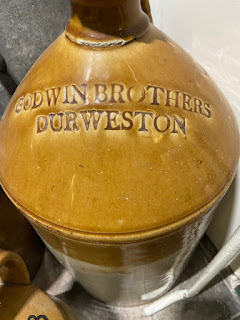Badger is not the only business to have brewed beer locally.
A few miles to the north-west of Blandford could be found the Durweston Brewery
owned by Henry Godwin. However, it is now more than a century since the Godwin
Brewery produced its last pint.
Henry Godwin had a workforce of sixteen and, for the times,
he must have been quite an enlightened employer. There is a newspaper report of
a brewery works outing in the 1860s to the Bath & West Show for all his
staff. Among his employees was a brewer, maltster, stoker, brewery labourers
and a carter who distributed beer to the Godwin public houses.
Established in 1753, the Godwin Brewery remained in the
family’s hands until it was sold to Hall & Woodhouse in 1898. Henry Godwin
was unmarried and there was no younger family member to take on the business. At
that time, the Durweston Brewery had an estate of twenty-six pubs.
When the business closed, Henry Colpitts Godwin ‘brewer, maltster & aerated water
manufacturer’ hosted a farewell supper for his staff and gave each employee
a cheque ‘as a parting gift’ the amount
being in proportion to the recipient’s length of service. This was some 60
years before the requirement to make redundancy payments was introduced. The
building that housed the old brewery is still standing.
White Horse Inn, Stourpaine,
Anchor Inn, Shapwick,
Half Moon, White Cliff Mill Street, Blandford,
Crown & Anchor, Wimborne,
Lord Nelson, Quay, Poole,
Woodman, Poole,
Antelope, Salisbury Street, Blandford,
Railway Tavern, Blandford,
Silent Woman, Wimborne,
New Inn, East Street, Blandford,
Harbour View Inn, Poole,
Castle Inn, Bryanston Street, Blandford,
Fleur de Lys, East Street, Blandford,
New Inn, Sturminster Marshall,
Royal Arms, Commercial Road, Bournemouth,
Fish Street Beer House, Poole.



Comments
Post a Comment